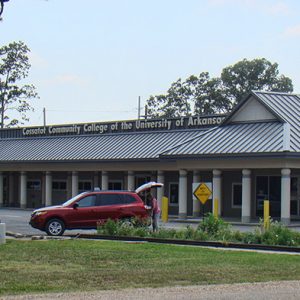calsfoundation@cals.org
Cossatot Community College of the University of Arkansas (CCCUA)
Cossatot Community College of the University of Arkansas (CCCUA) offers technical certifications and associate’s degrees, collaborating with other colleges and universities to offer bachelor’s and master’s degrees on its campuses at De Queen (Sevier County), Nashville (Howard County), and Ashdown (Little River County). It also offers four associate’s degree programs completely online.
In the 1970s, many Arkansas counties benefited from legislation of the Arkansas General Assembly allowing the establishment of two-year colleges, then called junior colleges. CCCUA was established in 1975 as Cossatot Vocational-Technical School, with a service area that included Sevier and Little River counties and shared Howard and Pike counties with what are now the University of Arkansas Community College at Hope (UACCH) and Rich Mountain Community College (RMCC) in Mena (Polk County). The school became a technical college through Arkansas Act 1244 of 1991. At that time, its enrollment was ninety-one students. In the 1990s, branch campuses were established in Nashville and Ashdown.
Joining the University of Arkansas System was made possible when Sevier County voters passed a one-quarter-cent countywide sales tax; similar taxes were passed with strong public support in Howard County in 2002 and Little River County in 2007. The benefits of this association included the promise to students that their credits earned at the two-year colleges would be transferred easily to the four-year colleges.
Since CCCUA became a technical college, CCCUA’s Sevier County campus in De Queen has added classroom buildings, the Kimball Library, a fire science building, a technology center, and a collision repair center. A childcare center, which is open both to the children of students and the public, provides instruction for students in the Child Development Program. A new amphitheater and two new agricultural buildings were completed in 2010.
In 2006, CCCUA’s Howard County campus opened with a new 40,500-square-foot facility on thirty-five acres just west of Nashville. It offers university transfer courses and certificate programs in residential construction, cosmetology, welding, and practical nursing. It also participates in the Arkansas Rural Nursing Education Consortium (ARNEC), a transition program for licensed practical nurses (LPNs) seeking to obtain registered nurse (RN) status.
In April 2009, the Little River County campus rededicated its 53,640-square-foot building, doubling classroom and faculty office space. This campus also houses the new Barbara Horn Civic Center. In addition to university transfer courses, Ashdown offers a new culinary arts program and a childcare center. A pre-engineering program was added in 2010. The college offers four Associate of Arts degrees, thirteen Associate of Applied Science degrees, a Licensed Practicing Nurse degree, and thirty-five technical certificates in a variety of fields.
CCCUA was accredited by the Higher Learning Commission of the North Central Association of Colleges and Schools in 1998 and again in 2002, with accreditation through 2013. In 2002, the Association of Collegiate Business Schools and Programs accredited its business curricula. The Automotive Service and Collision Repair programs were recertified in early 2009 by the National Automotive Technology Education Foundation. The college is approved by the Arkansas State Board of Nursing. Steve Cole of Lockesburg (Sevier County) replaced Frank G. Adams as chancellor in 2010.
CCCUA enrollment in the fall of 2023 was 1,345.
For additional information:
Cossatot Community College of the University of Arkansas. http://www.cccua.edu (accessed September 12, 2024).
Heard, Kenneth. “Lawmaker is elected Cossatot Chancellor.” Arkansas Democrat-Gazette. February 25, 2010, pp. 1B, 5B.
Linn, Mike. “Couple Donates $100,000 to Community College.” Arkansas Democrat-Gazette. September 8, 2007, p. 2B.
Sunni Thibodeau
Cossatot Community College of the University of Arkansas
Staff of the CALS Encyclopedia of Arkansas






Comments
No comments on this entry yet.